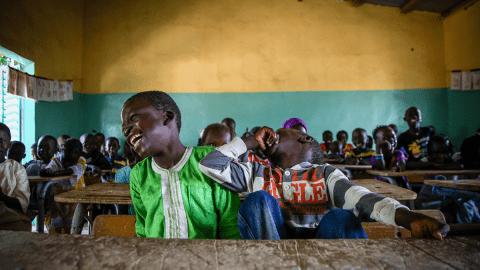
Education and Lifeskills
What we want to do:
We want to see all children in Senegal have the opportunity to receive a quality education that will prepare them for the opportunities and challenges of the future. We are working towards this by:
- Increasing children’s access to formal and non-formal education opportunities
- Ensuring children who attend school are learning
- Equipping communities to support education and participate in the effective management of schools.
- Ensuring children not only learn about academics, they also learn civic and moral values as well as their place and role as citizens both in their communities and in their country.
What is the problem?
A lack of qualified teachers, inadequate infrastructure, a shortage of instructional materials and antiquated and ineffective teaching methods coupled with communities with very low levels of education and literacy means that many children come from backgrounds that don’t value academic educations and those who do may still not be learning the skills they need to succeed later in life.
How is World Vision addressing the issues?
We are working with schools to ensure teachers have the necessary training, tools and support to be able to teach effectively. And, we are working with communities to educate parents and guardians about the importance of supporting their children with their schoolwork.
Is what World Vision doing working?
World Vision supports the State of Senegal in improving the quality of education by ‘considerably increasing the number of children who can read by the age of 11’. The ‘Unlock Literacy’ approach is implemented in 19 World Vision programs in Senegal with the aim of improving the reading skills of students in the first three years of elementary school (CI - CE1).
This is approach weaves several strategies together: training children on the five components of innovative reading, establishing community-based reading clubs, training parents on home child support, and creating additional reading resources based on local materials. Thus, since 2016 following the two-year pilot project, the teachers of the classes concerned have received annual training and monitoring by the inspectors, using tools that are stable and shared with the different actors.
2019 saw a rise in the number clubs as well as the number of club leaders, and teachers trained on the approach;
- 19,281 children attending community reading clubs;
- 294 community reading clubs set up;
- 324 community volunteers trained to support children;
- 11,974 reading booklets created.
In 2016 this approach produced a significant improvement in the percentage of children able to read and understand - up from 1% to 46% across the three pilot programs - so we scaled it up to all our intervention areas. A new school year reference study and an annual end-of-year evaluation were carried out in 2019.
What’s the impact?*
The reference study covered the 3,663 children of the CE1 year-group (approx. 7 year-olds). Supported by teachers, they were assessed using the School-Based Test About Reading tool in the tablet-based software Tangerine, and findings showed that 790 children knew to read and understand (22%). At the end of the school year, the proportion of children who could read and understand rose to 37%, an increase of 15 percentage points on the baseline. These performances are the result of an expansion in the number of reading clubs and the enthusiastic participation of children in club activities. Thousands of reading booklets created from local stories have been made available and distributed in communities. It is also worth noting that the teacher training has also been taken to the next stage, with the inspectorate carrying out more personalized monitoring and supervision. World Vision Senegal is therefore resolutely committed to achieving the government standard of ‘80% of students being able to read and understand’ by 2025.
*Numbers from 2019